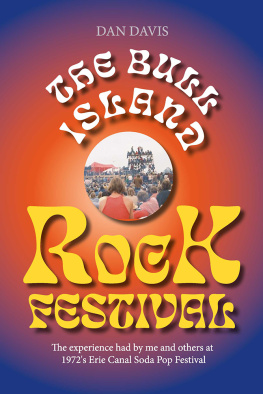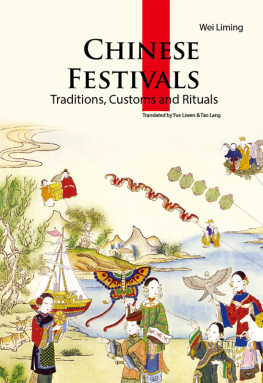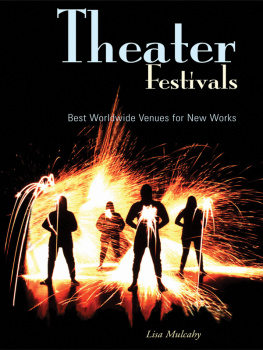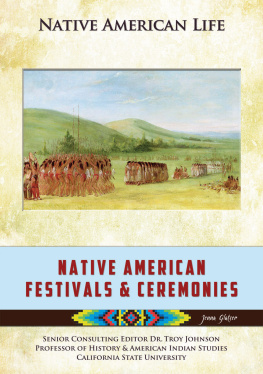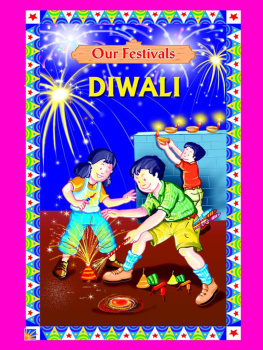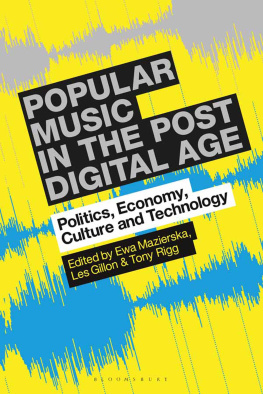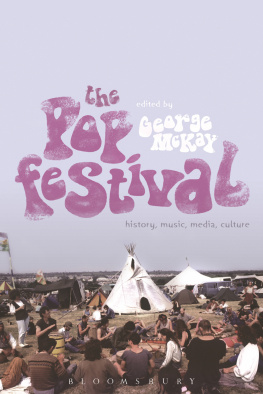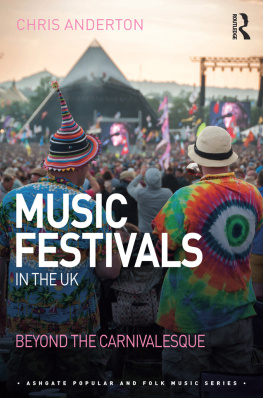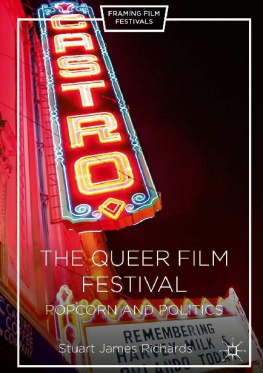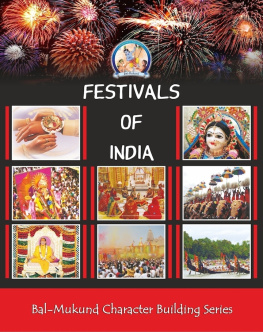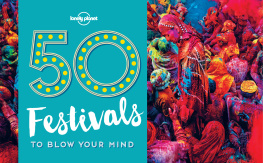Robinson Roxy - Music Festivals and the Politics of Participation
Here you can read online Robinson Roxy - Music Festivals and the Politics of Participation full text of the book (entire story) in english for free. Download pdf and epub, get meaning, cover and reviews about this ebook. City: Great Britain, year: 2016;2015, publisher: Routledge, genre: Romance novel. Description of the work, (preface) as well as reviews are available. Best literature library LitArk.com created for fans of good reading and offers a wide selection of genres:
Romance novel
Science fiction
Adventure
Detective
Science
History
Home and family
Prose
Art
Politics
Computer
Non-fiction
Religion
Business
Children
Humor
Choose a favorite category and find really read worthwhile books. Enjoy immersion in the world of imagination, feel the emotions of the characters or learn something new for yourself, make an fascinating discovery.

- Book:Music Festivals and the Politics of Participation
- Author:
- Publisher:Routledge
- Genre:
- Year:2016;2015
- City:Great Britain
- Rating:5 / 5
- Favourites:Add to favourites
- Your mark:
- 100
- 1
- 2
- 3
- 4
- 5
Music Festivals and the Politics of Participation: summary, description and annotation
We offer to read an annotation, description, summary or preface (depends on what the author of the book "Music Festivals and the Politics of Participation" wrote himself). If you haven't found the necessary information about the book — write in the comments, we will try to find it.
Music Festivals and the Politics of Participation — read online for free the complete book (whole text) full work
Below is the text of the book, divided by pages. System saving the place of the last page read, allows you to conveniently read the book "Music Festivals and the Politics of Participation" online for free, without having to search again every time where you left off. Put a bookmark, and you can go to the page where you finished reading at any time.
Font size:
Interval:
Bookmark:
MUSIC FESTIVALS AND THE POLITICS OF PARTICIPATION
For Boone
ROXY ROBINSON
Leeds Beckett University, UK

First published 2015 by Ashgate Publishing
Published 2016 by Routledge
2 Park Square, Milton Park, Abingdon, Oxon OX14 4RN
711 Third Avenue, New York, NY 10017, USA
Routledge is an imprint of the Taylor & Francis Group, an informa business
Copyright Roxy Robinson 2015
Roxy Robinson has asserted her right under the Copyright, Designs and Patents Act, 1988, to be identified as the author of this work.
All rights reserved. No part of this book may be reprinted or reproduced or utilised in any form or by any electronic, mechanical, or other means, now known or hereafter invented, including photocopying and recording, or in any information storage or retrieval system, without permission in writing from the publishers.
Notice:
Product or corporate names may be trademarks or registered trademarks, and are used only for identification and explanation without intent to infringe.
British Library Cataloguing in Publication Data
A catalogue record for this book is available from the British Library
The Library of Congress has cataloged the printed edition as follows:
Robinson, Roxy.
Music festivals and the politics of participation / by Roxy Robinson.
pages cm. (Ashgate popular and folk music series)
Includes bibliographical references and index.
ISBN 978-1-4094-5776-3 (hardcover) ISBN 978-1-3155-9678-5 (ebook) ISBN 978-1-3170-9198-1 (epub) 1. Music festivals Social aspects.
2. Music festivals Great Britain. I. Title.
ML3916.R63 2015
780.7841 dc23
ISBN 9781409457763 (hbk)
ISBN 9781315596785 (ebk-PDF)
ISBN 9781317091981 (ebk-ePUB)
Source: Tom Martin
Source: Tom Martin
Source: Scott Salt 64
Source: Tom Martin
Source: Jamie Baker
Source: Ales Prikryl/DustToAshes.com
Source: Ales Prikryl/DustToAshes.com
Source: Ales Prikryl/DustToAshes.com
Source: Ales Prikryl/DustToAshes.com
Source: Andrew Whitton
Source: Nick Caro
Source: Gobinder Jhitta
Source: Seb Barros
Source: Tom Martin
Source: Tom Martin
Source: BoomTown
Source: Benjamin Paul
Source: Benjamin Paul
Source: Bethan Miller
Source: James Gillham/StingMedia.co.uk
Popular musicology embraces the field of musicological study that engages with popular forms of music, especially music associated with commerce, entertainment and leisure activities. The Ashgate Popular and Folk Music Series aims to present the best research in this field. Authors are concerned with criticism and analysis of the music itself, as well as locating musical practices, values and meanings in cultural context. The focus of the series is on popular music of the twentieth and twenty-first centuries, with a remit to encompass the entirety of the worlds popular music.
Critical and analytical tools employed in the study of popular music are being continually developed and refined in the twenty-first century. Perspectives on the transcultural and intercultural uses of popular music have enriched understanding of social context, reception and subject position. Popular genres as distinct as reggae, township, bhangra, and flamenco are features of a shrinking, transnational world. The series recognizes and addresses the emergence of mixed genres and new global fusions, and utilizes a wide range of theoretical models drawn from anthropology, sociology, psychoanalysis, media studies, semiotics, postcolonial studies, feminism, gender studies and queer studies.
Stan Hawkins, Professor of Popular Musicology, University of Oslo and Derek B. Scott, Professor of Critical Musicology, University of Leeds
Writing this book felt a lot like trying to hit a moving target, for its subject matter collaborative forms of participation at music festivals was in flux. During the course of six years of research such forms became, nonetheless, an increasingly discernible facet of the UK industry. This was largely down to the fact that immersive design, already fashionable in the fields of contemporary theatre and art, was making its way into festival culture. The question was, what were the underlying causes of this trend? And, had it recast the role of the festival audience? I began to explore this by looking at how two very successful events Burning Man, in the United States, and Secret Garden Party, in the United Kingdom were entangled, focusing on the ways they both idealized audience autonomy and extreme participation. The capacities of both were growing at speed, and they similarly alluded to what was to me a peculiar, and, Ill willingly admit, romantic notion: a festival produced by its audience. Not in a cerebral or symbolic sense, but actually produced with ticket-buyers physically creating entertainments on site. The surreal environments of these two festivals, one inspired by the other, were the outcome of many hands. They were built by crews and collectives sourced from festival-goers, recreating the urban diversity of the world outside while subverting its norms and values. Towards the end of an extensive analysis of the ideals shared by these events, and their suffusion into the larger sector of British boutique festivals, Hampshires BoomTown Fair had quickly grown to prominence. With an extreme approach to theming, narrative, visual display and mixed programming, by 2014 this event had become the fastest-growing independent festival in the UK. It championed an ethos of extreme participation that was inspired by the same ideologues underpinning Burning Man. By the time you find this book in your hands, there may well be other, large-scale festivals conspicuously aligned to this ethos, or perhaps the trend will have gone out of vogue. Whatever the future may hold for music festivals, this book is focused on the ideals of events that sit within a particular breed, as they are today. Throughout this book, I often refer to this category as boutique (though I have never felt wholly comfortable labeling festivals, and as testifies, there are variant meanings associated with the term). I can state with confidence that the popular theatricality, costumes and diversity of arts to be found at some of these events as illustrated on the front cover of this book are intriguing phenomena to behold. Although examining how financial incentives for economic survival have shaped this colourful terrain forms an important theme in my approach to understanding this celebratory context, I hope to do full justice in illuminating the reader on what is essentially a bacchanalian culture of human expression.
. I also owe thanks to my research assistant Cassandra Kilbride for her enviable efficiency and attention to detail, and to the various photographers who donated the use of their images (Seb Barros in particular, who supplied the eye-catching cover image). Credit is also due to the UK Centre for Events Management, at Leeds Beckett University, which part-funded the research, and to the industry figures and collectives that have, over the years, kindly donated their time to the project in various ways: Freddie Fellowes, Ben Challis, Claire ONeill, Lak Mitchell, Kaptain, the Booty Skool Dropouts, Bearded Kitten, Alex Trenchard, Demelza Blick, the Happy Slap Boutique, the Danceoff crew and the Asbo Disco. Just before this book was published, I received an email from a Burning Man rep (much to my excitement), Zac Cirivello the events media co-ordinator. Zac remains known to me only through email, but he is owed a sizeable cheers for fact-checking all of the information relating to Burning Man found in this book, and for some very kind words of encouragement. For keeping me buoyant (an essential for completing any book), Rowan, Katie, Helen, Dan, Colleen, Tenley and Claire: the next round is on me. I would also be treading dangerous ground if I forgot to thank my family, especially my marvellous dad, Massoud Yeganegy, who has always spurred me on, encouraged me to publish, and done much to help me reach the finish line. Particular thanks are owed to Professor Derek Scott, my mentor and friend, for his insight and guidance, without which this book would have forever remained almost done. Finally, I am enormously grateful to my husband, Ben Robinson, to whom this book is dedicated. He organized all of the stunning photography found in this book, and supplied me with his usual reassurances, inspiration, feedback and love. Immeasurable thanks.
Next pageFont size:
Interval:
Bookmark:
Similar books «Music Festivals and the Politics of Participation»
Look at similar books to Music Festivals and the Politics of Participation. We have selected literature similar in name and meaning in the hope of providing readers with more options to find new, interesting, not yet read works.
Discussion, reviews of the book Music Festivals and the Politics of Participation and just readers' own opinions. Leave your comments, write what you think about the work, its meaning or the main characters. Specify what exactly you liked and what you didn't like, and why you think so.

